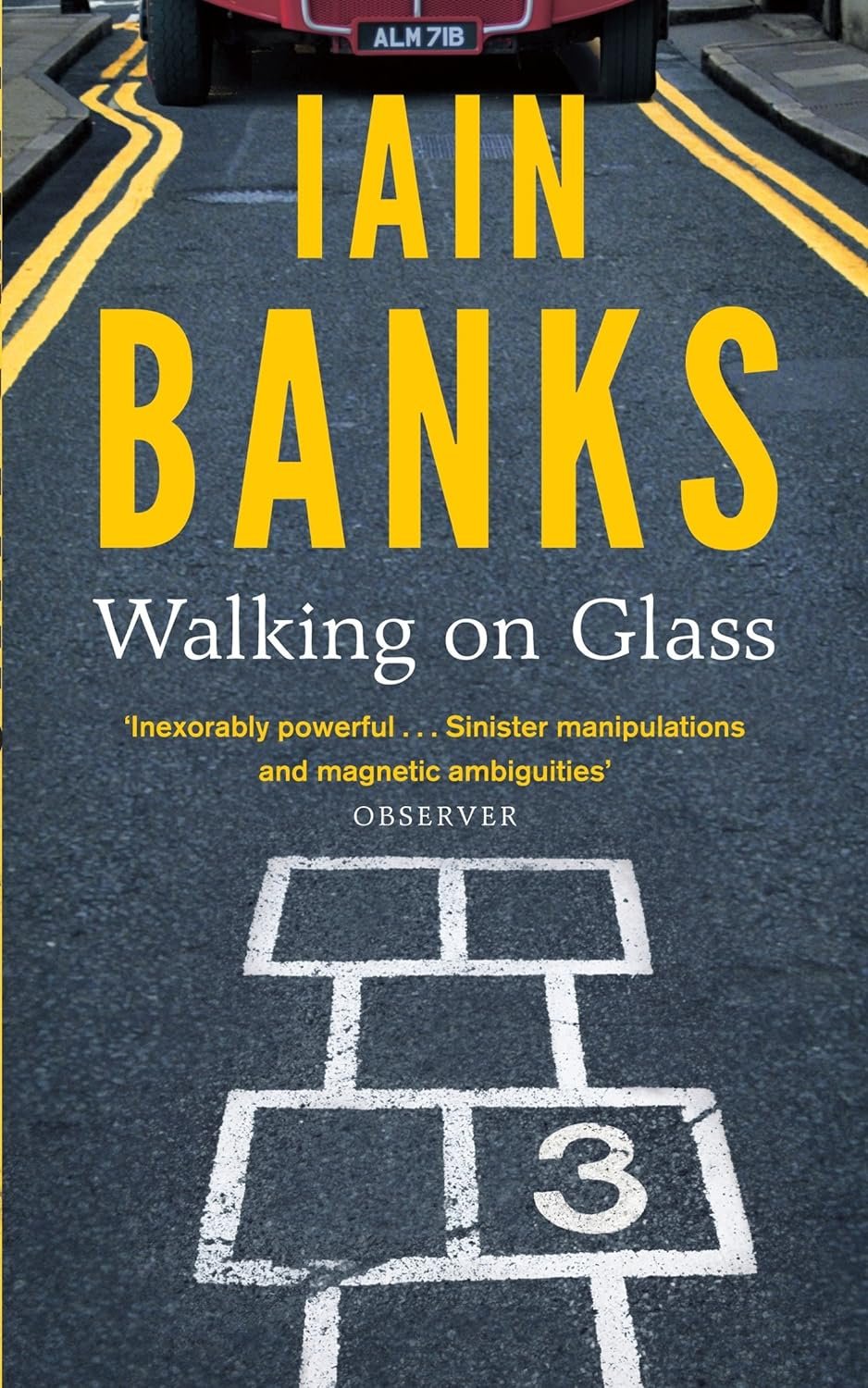Review: Walking on Glass by Iain Banks
Blurb:
Graham Park is in love. But Sara Fitch is an enigma to him, a creature of almost perverse mystery. Steven Grout is paranoid - and with justice. He knows that They are out to get him. They are. Quiss, insecure in his fabulous if ramshackle castle, is forced to play interminable impossible games. The solution to the oldest of all paradoxical riddles will release him. But he must find an answer before he knows the question.
Park, Grout, Quiss - no trio could be further apart. But their separate courses are set for collision.
Review:
Here marks the beginning of my relationship with Iain Banks’ literary Rubik’s cube.
Published in 1985 by Macmillan, Walking on Glass was Banks’ second mainstream novel. Although it appears that a version of it may have been written and almost published prior to The Wasp Factory in 1984.(1) Many more were to follow, half of which were science fiction; written under the name Iain M. Banks. In total, Bank’s bibliography comprises twenty-seven novels; the last of which was published after his death in 2013.
When you sit down to write a review for a book like this, the temptation is to approach it with the same care and attention with which it was written; to try and impress upon the review the intellectual muscle necessary to appeal to those to whom the book might appeal. I admit, in good humor, that I’m not smart enough to do it. If you do decide to read it and feel like delving into the ontology, there are plenty of papers and blog posts written by people who are, and I’ll link them in the description.
What I will attempt to do is impart a seed of curiosity. In the hope that Bank’s incredible talent will continue to impress, render mute, and stagger another generation of readers and reviewers. Because he really was a world-class writer, and even a decade on, I still sorely miss awaiting his releases.
“Three three three. A good omen.”
A first page hook for me; in no small part due to my own obsession with this number.
Walking on glass likes threes. There are three narratives, three chapters per part, and, from what I can see, three layers of interpretation: deep, deeper, and ‘hang-on-a-minute.’ I’ve read the reviews: the vast majority of the ones I’ve seen address only the first layer, with a cursory glance at the second. This is a shame, and Banks was quoted as saying that the book "didn't do exactly what it set out to do and I think you have failed to an extent if the reader can't understand what you're saying. I worry sometimes that people will read Walking on Glass and think in some way I was trying to fool them, which I wasn't." (source) I hope you’ll trust me when I say that if you can handle ambiguity and find magic in the undefined, that you will enjoy it despite the criticism.
On to the narrative trio: In 1980s London, we have a man who is hopelessly in love with a woman who continues to evade his grasp. We also have a paranoid and rather unwell man who is fired from his job after an unfortunate incident involving a cat and a shovel. And then, very much not in 1980’s London, we have an elderly pair who are trapped in the games room of a castle, in some sort of post-apocalyptic wasteland, where the heating is failing, imprisoned until they solve the answer to a paradoxical riddle.
Yes. Indeed.
Each is as compelling as any other on its own merit, and there are, as you would suspect, moments of collision between the three stories. However, these collisions, and the way they reference each other are where this book likes to play its own games with your mind, and present you with your own riddle. It hands you its own keys with which to escape its grasp, with the easy way out, or the hard way out. It makes you want to delve into the passing references for context, and look for clues in page numbers, read academic texts to understand “why?”
And I did. And though I finished the book weeks ago, it’s continued to follow me; found its way into the dark and cold fringes of my mind, where it continues to push against the limits of my intellect.
This book is a rabbit hole. One that makes me want to be smarter. Makes me want to write smarter. To read smarter.
Here marks the beginning of my relationship with Iain Banks’ literary Rubik’s cube.
Please reach out for me if you would like to read or discuss this book. I may even be able to convince Boe to let us have a buddy read. To all those walking on glass, thanks for reading.
https://journals.openedition.org/etudesecossaises/208 (1)
http://sfpotpourri.blogspot.com/2014/04/1985-walking-on-glass-banks-iain.html
https://www.tandfonline.com/doi/pdf/10.1080/00393270500355148
